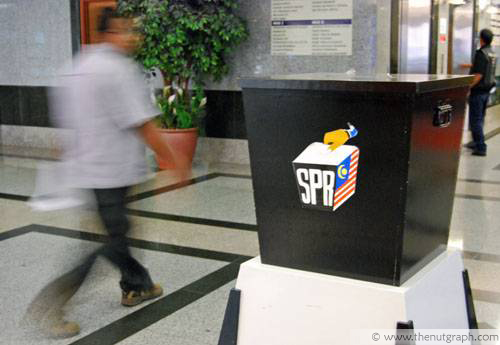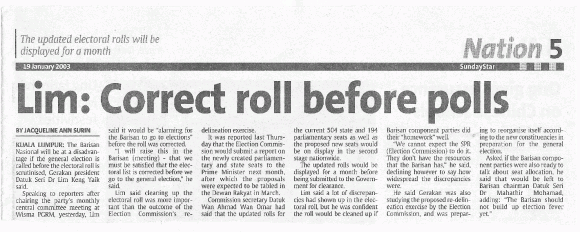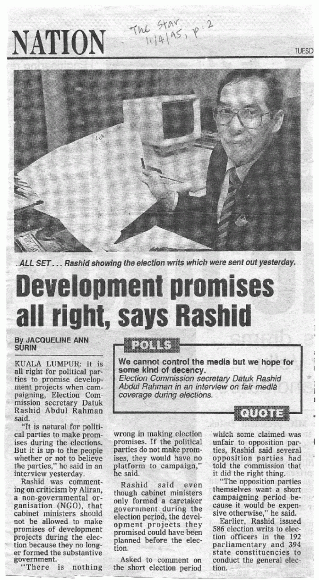Who says the EC is independent?
Shape of a Pocket by Jacqueline Ann Surin | 14 May 2012
FRANKLY, I wasn’t surprised at all when it was reported in late April that both the Election Commission (EC) chairperson and deputy chairperson were Umno members. Even without evidence of party membership and despite the EC deputy chairperson’s subsequent U-turn and denial, it would not be a stretch to imagine both the chairperson and his deputy are Umno members.
I don’t doubt PKR’s announcement about the top EC leaders’ purported political membership was strategically timed to be released a day before the 28 April 2012 Bersih 3.0 protest. Clever strategy aside, Umno membership alone isn’t the only evidence of the EC’s lack of independence. The evidence has been mounting over the years.

Wan Ahmad Wan Omar
What other proof do we have? And how can we be oh-so-certain that the EC is not independent even if it’s eventually demonstrated that neither Tan Sri Abdul Aziz Mohd Yusof nor Datuk Wira Wan Ahmad Wan Omar are members of any political party?
A subservient commission
Firstly, every single member of the EC, including the chairpersonand deputy chairperson, is a former civil servant. The most recent appointment, Datuk Christopher Wan Soo Kee, was formerly the former Kuala Lumpur Special Branch chief. This composition in itself sets the EC up for bias since civil servants’ professional training is to carry out the wishes of the government of the day.

Abdul Aziz Mohd Yusof
This point was made by Bersih 2.0 in its recommendations to the Parliamentary Select Committee (PSC) on Electoral Reform in November 2011. It argued that in a country where only one coalition has formed the federal government since 1955, “inevitably, senior civil servants slowly stop making the distinction between the government and the political party”. That includes the Royal Malaysian Police Force as well, which has often demonstrated that BN events can proceed without a hitch while Pakatan Rakyat functions are often prevented from going ahead.
Bersih 2.0’s claim is supported by the testimony of EC officials themselves. In an interview by a team of researchers with the top three EC officials in the 2000s, the then chairperson, deputy chairperson and secretary said it was “normal for them to see the prime minister even before constituency reviews were begun”. The chairperson added that “as a practical matter, requests for meetings by ‘number one and number two’ could not be refused, unlike similar requests from lesser political leaders”. [1]
It is not only academics who have reported on the subservient relationship between the EC and the government of the day. In the course of researching for this column, I found an old news report I wrote in The Star on 19 Jan 2003. The article quotes the then EC secretary as saying that the commission would submit the updated electoral roll to the government for clearance after it had been displayed.
Many citizens have also witnessed first-hand the EC’s subservience to the BN. At a Bersih 2.0public forum on 21 Feb 2011 in Petaling Jaya, for example, Wan Ahmad’s constant refrain was: “We can propose [reforms] but ultimately, the government decides.”
Competency or complicity?
Then there is the long-standing issue of gerrymandering and unconstitutionalmalapportionment. Through the years, the EC has redrawn the boundaries of constituencies in ways that have benefited the BN. Is that the mark of an independent commission ensuring free and fair elections?
And there’s been the refusal by the EC to take the BN to task for vote buying through the use of taxpayer’s monies to offer development projects just before the polls. This was most recently notable during the 2011 Sarawak state election. Indeed, it was the EC’s stubborn refusal to even speak up against or investigate the potential violations under the Elections Offences Act in Sarawak that compelled Bersih 2.0 to organise its mammoth rally on 9 July last year.
To be fair to the current EC leadership, chairperson Abdul Aziz is only following in the previous EC leadership’s footsteps. In 1995, then EC secretary Datuk Rashid Abdul Rahman declared there was “nothing wrong in making election promises” during an election campaign:
What does the EC’s apparent ignorance of these election breaches tell us? It tells us that even if the EC leadership are not Umno members, they are either incompetent or complicit with the BN. And it would seem that they have been for at least the past 17 years.
Rescuing the EC
Many academics have, for the past 15 years or more, noted how unfair and problematic our electoral system is. In 1996, notable Australian academic Harold Crouch wrote: “The Malaysian electoral system … [has been] so heavily loaded in favour of the government that it is hard to imagine that [it] … could be defeated in an election.” Ten years later, another academic, J Funston, echoed the same sentiment because nothing had changed. Funston wrote that “EC activities frequently provided direct benefits to the BN”.
How can the EC be rescued? The EC may think that merely choosing a “non-aligned colour” instead of yellow in its logo will do the trick. However, the mountain of evidence that the EC is either incompetent at its best, or not independent at its worst, means much more needs to be done.
In its recommendations to the PSC on Electoral Reform, Bersih 2.0 proposed several measures that would ensure Malaysians had an EC they could have confidence in. One, why can’t we have an EC that comprises more than just retired civil servants? If necessary, the number of commissioners can be increased to ensure wider representation and expertise.
Two, some of the issues we face can actually be addressed by establishing a Code of Conduct, as practised in India, which spells out best practices for all parties and candidates during an election. This code of conduct could also be applied to the media so that newsrooms can be pressured to ensure fair coverage of all candidates and parties no matter their political affiliations.
And three, if the EC is to regain some semblance of credibility, it needs to reclaim its power to make rules under Article 113(5) of the Federal Constitution. These rules can be used to prohibit the use of public institutions or government machinery in election campaigns.
The question, of course, is whether the EC wants to be rescued. If the growing evidence of more than a decade is anything to go by, I doubt it. And if the EC won’t reform itself of its own volition, what else are citizens left to do? 

[1]
Lim, HH (2005) “Making the system work: the Election Commission”, in Putucheary, M and Othman, N. (ed.), Elections and Democracy in Malaysia, Universiti Kebangsaan Malaysia, Bangi, p.263.
Lim, HH (2005) “Making the system work: the Election Commission”, in Putucheary, M and Othman, N. (ed.), Elections and Democracy in Malaysia, Universiti Kebangsaan Malaysia, Bangi, p.263.
Jacqueline Ann Surin believes the EC should not be so worried that with electoral reforms, BN will lose power. The commission should be more worried that without electoral reforms, BN will come into power only to have its legitimacy questioned.


No comments:
Post a Comment